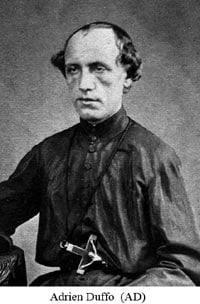Born in La Barthe-de-Neste (Hautes-Pyrénées), April 7, 1827
Taking of the habit in N.-D. de l’Osier, November 20, 1849
Oblation in N.-D. de l’Osier, November 21, 1850 (no290)
Ordination to Priesthood in Marseilles, May 29, 1851
Died in Paris, April 18, 1887.
Duffo entered the novitiate against the will of his parents. In a report written by the novice master, Duffo is described as “one of those righteous and ardent souls who can never do enough for God”. This testimony remains characteristic throughout his later life. In 1851, he received his obedience for Ceylon. Almost immediately after his arrival there on July 22, he was transferred together with the Fathers Pulicani and Perréard to the Vicariate of Colombo where there was a shortage of priests. Until 1865 the centre of their activity was Kandy, but they were responsible for its surroundings as well. The city of Kandy was a Buddhist centre and the few Catholics (about 1500) were found mostly among people of Portuguese descent and the British rather than among the Sinhalese and Tamils. Repeatedly Duffo mentions the problem of religious indifference and the fact that, for many, religion consisted merely of a series of external devotional practices. Catechesis in Kandy required much patience and effort. He stated to Bishop Semeria that the missionaries were so busy with catechism, hearing confessions, visiting the sick etc., that periodic journeys to the out-stations were regarded as a vacation. And yet such expeditions were exhausting. In a letter to Bishop de Mazenod (1860), Duffo described how difficult it was to travel in a small bull cart through the mountainous Central Province, up to Badulla and Nuwara Eliya. Between September 1853 and September 1859 Duffo and his confrères had baptized 203 children, as well as 98 Buddhist and 52 Protestant adults.
Besides being partly responsible for the parish in the city of Kandy, Duffo was also chaplain of the prison. Baptist and Anglican ministers attempted to hinder this apostolate and to put an end to the influence he exercised on the prisoners. They argued that a Catholic priest held no rights in a British colony. Mr. Braybrooke, a British magistrate, however, proved them wrong. Their complaint was dismissed on the ground of a law that stated that ministers of all religions were to have free access to the prisons. Among the prisoners to whom he had the privilege of baptizing was the famous Sardiel, a bandit who for many years had made the roads of the Central Province unsafe and had repeatedly escaped capture by the British police. Sardiel was an intelligent man and after reading several books on the Catholic Church, he was able to assimilate the ideas, allowing himself to be touched by grace.
In the second half of 1864 Duffo was sent to the Negombo district, together with Fr. Perréard. A year later he was transferred to the mission of Chilaw, where he built the largest church in the Vicariate, adorned with life-size statues. In 1872 he was given the responsibility of the mission of Kurunegala. He remained there for eleven years, which was the most intense period of his activity and apostolate. He built a convent for the Sisters of the Holy Family, who arrived in 1874. An orphanage and a school were also constructed thanks to his efforts. Some of these buildings were renewed in 1879. Because of his kindness and wisdom, newly arriving missionaries were entrusted to Fr. Duffo to be introduced into apostolic life.
When in 1883 the Colombo Vicariate was granted to the Oblates and Bishop Bonjean became the first Oblate appointed to the See, Duffo was one of the missionaries designated to receive his obedience for the new apostolic field. This choice was expected since he had already worked in the Colombo Vicariate for several years. He was assigned to Bolawalana and some time later to Kalutara. Although he was known as a strong and robust man, the great amount of hard labour and the unhealthy climate cut him down. Plagued by sickness he travelled to France in 1886. He died the following year. He was 60 years of age and he had spent 36 years in Ceylon. The news of his death caused great consternation in Ceylon, especially in the Kurunegala district where the memory of his dedication to the people had remained so much alive that by 1909 Christians were still giving his name to their children.
Father Duffo had a gentle character. In all the places where he was assigned he played a mediating role. All the available documents show him to be a man with a good heart and a healthy piety. He had imposed upon himself serious discipline. Duffo took the necessary time for prayer, but also for the study of languages. Contemporaries have testified that he had nearly a perfect knowledge of Sinhala, Tamil and English. When the Prince of Wales was visiting Ceylon, it was Duffo who was requested to welcome the noble visitor in the name of the Catholic community of the Island. His apostolic zeal was great. He baptized John Pahamunay, a young Buddhist destined to become a monk and already wearing the yellow frock. Pahamunay was later to become an Oblate in 1890.
Robrecht Boudens, o.m.i.

